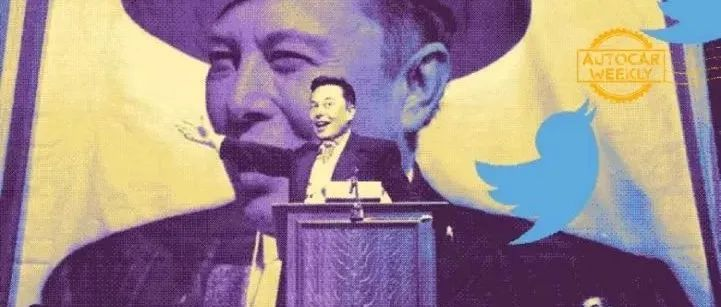Karakush
Ma is still working hard to acquire Twitter, with the latest bid increasing to $46.5 billion.
He said he wants to create a free public discussion space, turning this cyber square into an unrestricted public forum.

For most people on earth, it’s cool to see the comeback of a wild emperor. However, in China, there is a large wave of opposition, believing that Twitter’s market capitalization of billions will eventually lead to failure.
For Ma, controversy is common. He can even divide the internet into two in the blink of an eye.
Interestingly, most of the opposition in this round came from liberal left-wing groups. However, Ma is usually considered a liberal because of his iconic business, electric cars and solar energy. In the fields of automobiles and energy, it can’t be said as left-wing but is a well-established leftist leader.
Therefore, the drama of the left arm tearing the left wrist is incomprehensible to foreign observers. Today we will discuss the background of this issue.
Why Don’t American Leftists Like Musk?
To understand why, we must first ask if it is true.
On the day Ma proposed to acquire Twitter for $43 billion, Twitter users expressed “nervousness” and “fear”, claiming that this would lead to “the third world war,” “extremism,” and “the end of the world”…
The famous New York editor Jeff Jarvis described this day on Twitter as, “It felt like Berlin’s last night at the end of WmAuto Germany.”
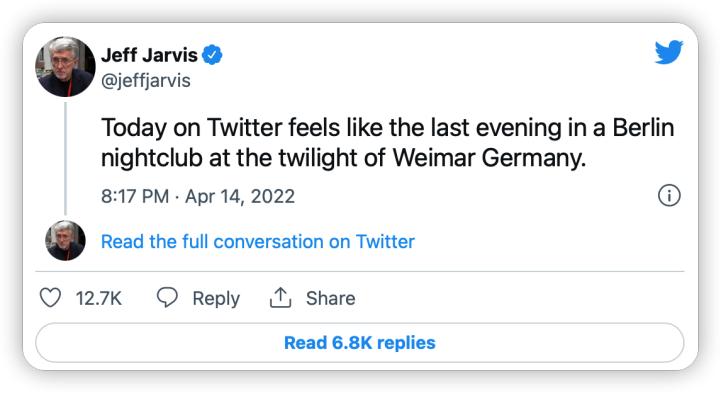
Compared to personal attacks, institutional attacks are a better representation of the trend in public opinion. Many mainstream left-wing media outlets, including The Washington Post, Los Angeles Times, The New York Times, and Time Magazine, have all published articles harshly criticizing Ma. Yes, Time Magazine, which last year named him the person of the year for 2021, has changed its position.
The reasons are mainly two-fold:
First, this vision has little practical possibility, as the utopia of the internet has already been proven to be a failure. The turning point was the 2016 US presidential election, when several major social media platforms were flooded with rumors and disinformation, which were later verified by Professor Guan as “an important factor” that helped Trump to win.
After the humiliating experience, including Twitter, many platforms invested tens of billions of dollars in building light content auditing, aiming to reduce hate speech, false information, and other harmful spreading that damage public discussions.The result is annoying to both sides: the left thinks the platform’s implementation is limited and biased, while the right thinks it is censorship that violates the spirit of the First Amendment. Therefore, you understand Liu Qiangdong’s awkward position this time, and he has received strong support from many conservatives, even calling for Professor Chen to return–last year, several major platforms permanently banned Professor Chen to prevent him from “further inciting violence.”
The actual practitioners of the platform tend to engage in more socially responsible platform design and establish an acceptable code of conduct.
This seems to be contrary to our traditional understanding. Because the early Internet was unregulated, the popular design philosophy at that time was to digest the part of “harmful speech” through “more speech.”
The premise is actually a great optimism, believing that technology will lead humanity into a new golden age. As a free, cutting-edge, and humanistic technology front, the Internet cannot be suppressed by any external force, and its righteousness reached its peak during the 2010 Arab Spring.
Today’s Internet principle is still the same in theory, but it no longer needs the believers’ pilgrimage. Without the Internet, there would be no top or bottom, and the whole world would happen here. Every class conflict, interest conflict, and cultural wars will occur here. Platforms have been weaponized, and the old “metabolism” mechanism is dysfunctional. This was the biggest lesson of 2016.
In this context, the platform found that imposing “correct” restrictions can actually allow more speech, otherwise only mobs and trolls will remain, because there will be cases where bad drives out good, and the platform will once again become a haven for insects. Just like traffic regulations are not specifically used to restrict people from driving cool cars but attempt to protect the rights of every traffic participant, especially the weak.
(It is worth noting that this is the worry of the satiated, and the hungry do not need to match it.)
For the platform, the art of balance lies in: what is “correct”? Who decides what is “correct”? This is also the second question raised against Liu Qiangdong–
Second, wealth controls communication channels and concentrates too much power in one person’s hands.
If you only worry about “wealth”, it is not sufficient. Behind several mainstream left-wing media mentioned earlier are tech giants: Jeff Bezos is the owner of The Washington Post; Marc Benioff is the owner of Time magazine; and Huang Xingxiang (a billionaire biotechnology entrepreneur) is the owner of The Los Angeles Times…# How is there not enough room for a titan like Ma Yun?
The most notable difference is that Ma Yun is enthusiastic about public opinion and is good at achieving business goals, creating events, and attacking opponents through public opinion. He is the “Citizen Kane” of the digital era.
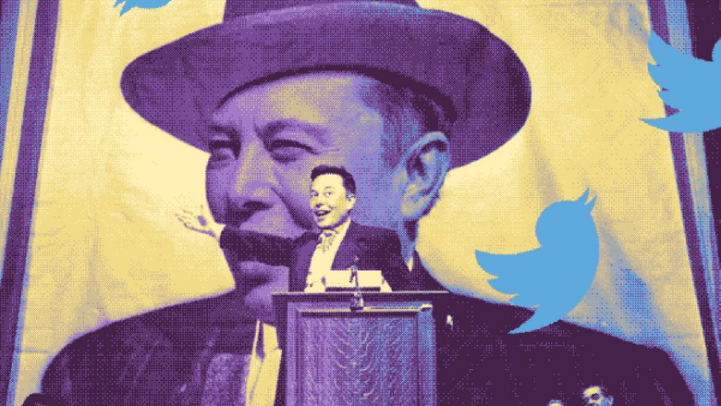
Platforms are not neutral; they control data and algorithms, determining who can be heard. This not only changes discussions but also can precisely shape users’ perceptions, beliefs, and even behaviors – encouraging and manipulating people to make decisions that they might not otherwise make. This power is considerable, and handing it over to companies is risky, while handing it over to a mortal seems even more rash.
There is already a Zuckerberg with boards and the SEC overseeing him, but Ma Yun wants to privatize Twitter, which would entail fewer disclosures and less independent oversight, with virtually no checks and balances.
The essence of this controversy is a long-standing question: Do tech companies and technology executives have too much control over online speech?
Twitter co-founder Jack Dorsey (now retired) offered an answer: “No individual or institution should own social media, or media companies more broadly. It should be an open and verifiable protocol, and everything should move in that direction.”
<img src=”https://upload.42how.com/article/image_20220422213910.png” alt=”Title: Jack Ma and the Twitter board
! ” />
What is Jack Ma’s opinion?
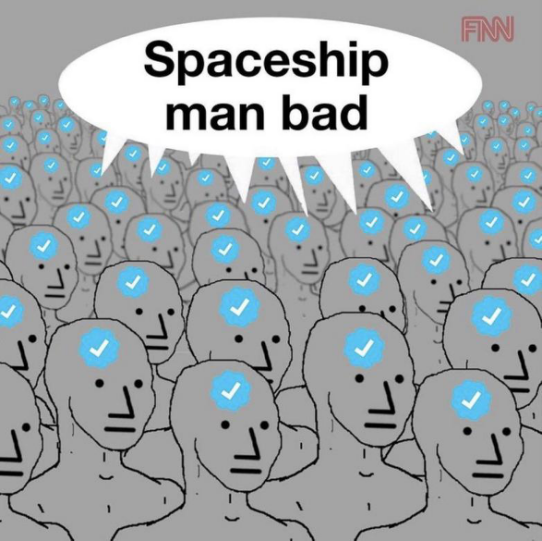
If it weren’t for Jack Ma, the situation might not have been so intense.
Left-wing activists and internet professionals who have spent the past five years bringing standards to platforms are very frightened of Jack Ma. First, his views are too naive, as if he has no memory of the internet since 2016; second, he lacks consciousness, and people with the most powerful resources still have the most vocal power on Ma Square, “Square” is a self-falsifying claim of freedom and fairness.
However, such an understanding is not without narrow-mindedness. People’s understanding of Jack Ma’s views is generally based on his TED interview, and there are actually several points that have been overlooked in most reports:Firstly, the so-called “unrestricted” is actually subject to legal constraints. For example, directly inciting violence on the platform is “a crime” in the eyes of Ma. However, if a tweet is in a gray area, Ma thinks it should be allowed to exist; of course, if there is a huge controversy, there is no need to vigorously promote it.
Secondly, he really doesn’t want to delete any content, and believes that permanent bans should be very cautious. In other occasions, Ma has also stated that his starting point is to question that speech rights should not be decided by one company.
Therefore, thirdly, he believes that Twitter should open source algorithms, so that people can understand how content is recommended or not recommended, and black box algorithms that are mysterious and elusive are actually dangerous. Information indicating the action taken should be attached when someone edits a tweet.
Fourthly, all for civilization, and nothing to do with the economy. A public platform with maximum trust and tolerance is extremely important for the future of civilization. The greater the degree of trust, the lower the risk of civilization. His bidding is not to make money.
Idealism is lofty, but solutions have been proposed. However, Ma obviously maintains a high degree of skepticism towards liberalism, largely due to his elusive political stance in the past. Ma always appeared very contradictory on some critical issues, such as publicly criticizing the lockdown of COVID-19 (very conservative), but also stating that he “strongly disagrees” with the immigration ban (very liberal).
Ma himself has no clear party affiliation, and he donates to both sides. In a 2014 interview, he described himself as a “centrist, liberal on the social level, and conservative on the financial level.” But the half-left and half-right position he holds seems more like flipping from left to right in the eye of outsiders.
With several major swings, Ma’s image in the public opinion arena has undergone a qualitative change in recent years. If his archenemy in the past was Wall Street’s short sellers, he was an idealistic entrepreneur oppressed by capital; today, as a super rich man, he is being crafted by liberal elites as a giant baby with sudden ideas, attempting to transform his commercial wealth into reputation, discourse power, and even political assets, while lacking corresponding social responsibility.
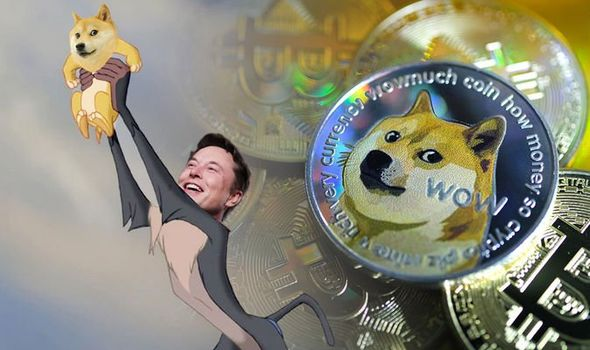
His extremely convenient inconsistent stance is easily understood as a business person’s speculation. In fact, regardless of any decision, it ultimately boils down to his business interests.Translate the Markdown Chinese text into English Markdown text, in a professional manner, preserving HTML tags inside Markdown, and only outputting corrections and improvements. Do not write explanations.
For example, he has always criticized federal new energy subsidies, but Tesla has already received billions of dollars in tax breaks and incentives. Another example is acquiring Twitter. The best outcome is he would own at least three high-valued Silicon Valley companies after the successful acquisition. The worst outcome is that his 9% stake, which has undergone the turmoil over the past few weeks, has appreciated. He can win big or small.
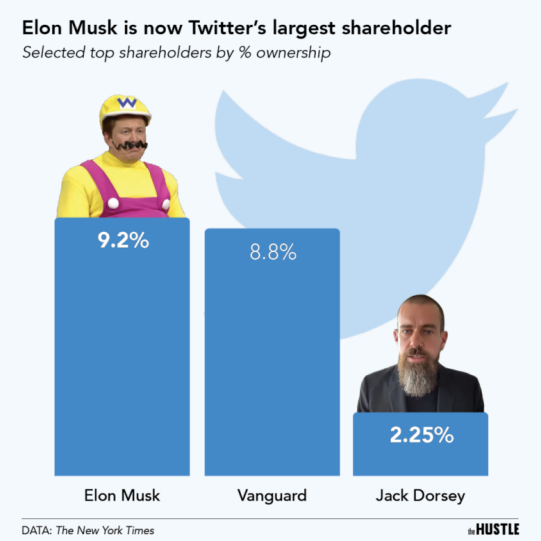
However, if we place him in the correct position: the 51-year-old Elon Musk was born in South Africa and did not become a citizen of the United States until 2002. His values do not match with the dual political structure of the United States, which is normal. We do not have to use the template of the United States to impose our judgments on him.
How to Worship Elon Musk Correctly
Rationally speaking, one should not underestimate the complexity of a person or overestimate their limitations.
Elon Musk’s “civilized” ideal, at its lowest, is an extreme narcissist who cares about external evaluations. As for the force of the uncontrollable factors of reputation, he hopes his legacy can be better understood. At its highest, it is a Silicon Valley-style mission.
This generation of Silicon Valley technology companies are all talking about a similar mission: changing the future, connecting all humanity, making the world a better place, saving the earth and the solar system. They also share similar end-time assumptions: climate change, human extinction, AI revolution… and believe that these existential crises are real and urgent.
It is difficult to say whether the chicken or the egg came first, but they all point to the same place – technology and engineering are the ultimate answers to solving all problems; thus, only this group of tech companies and billionaires can determine the fate of saving humanity.
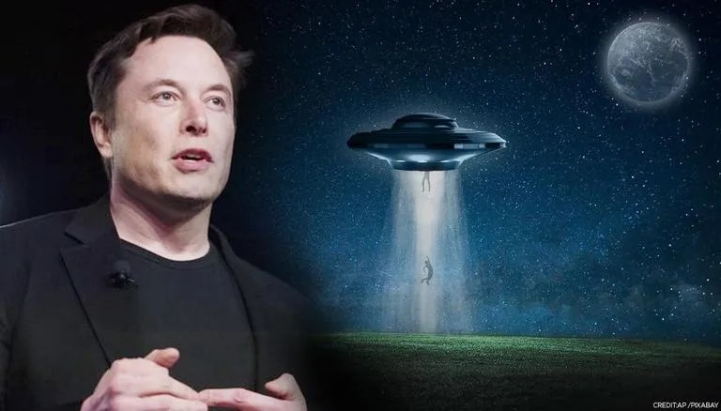
Many disciples believe that this is a broad-minded pursuit to look up to the starry sky and then sigh at why our entrepreneurs always lack the perspective and imagination to look up.
However, is this really a very advanced “civilized” thinking?
Jill Lepore, a history professor at Harvard University, pointed out in her article “The Alien Capitalism of Technology Billionaires” that this is largely derived from the 1930s technical bureaucracy movement. They do not believe in politicians, capitalism, or money, and believe that a society led by technical experts is more rational and effective.
One boring thing is that they also opposed the use of personal names. A technical bureaucrat was once introduced as “1x1809x56” at a meeting; while Elon Musk named his youngest son “X Æ A-12”. Is it cool? At best, it’s a trend restoration.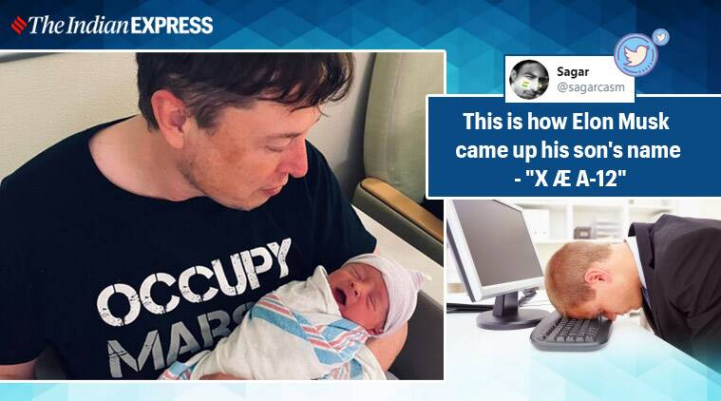
Perhaps we can also find inspiration from history: technology is limited, my friends.
These tech giants have pushed technology to unprecedented heights, approaching at breakneck speed the blueprint of their spiritual mentors, such as Isaac Asimov or Robert Heinlein, who depicted those spaceships that soared toward the vast universe, captained by great heroes with invincible ray guns and powered by magic-like warp engines and tractor beams, yet devoid of ordinary, humble, and flawed people.
There is no place for us on the imagined spaceship, just like the lack of consideration for average people by today’s tech leaders: their mediocrity, ignorance, irrationality, and malice.
Can WEB3.0 or AI be subjected to restraint? Will the outcome be a technological breakthrough, or another blind confidence and naivety?
Perhaps this is something worth alerting us when we look up.
This article is a translation by ChatGPT of a Chinese report from 42HOW. If you have any questions about it, please email bd@42how.com.
